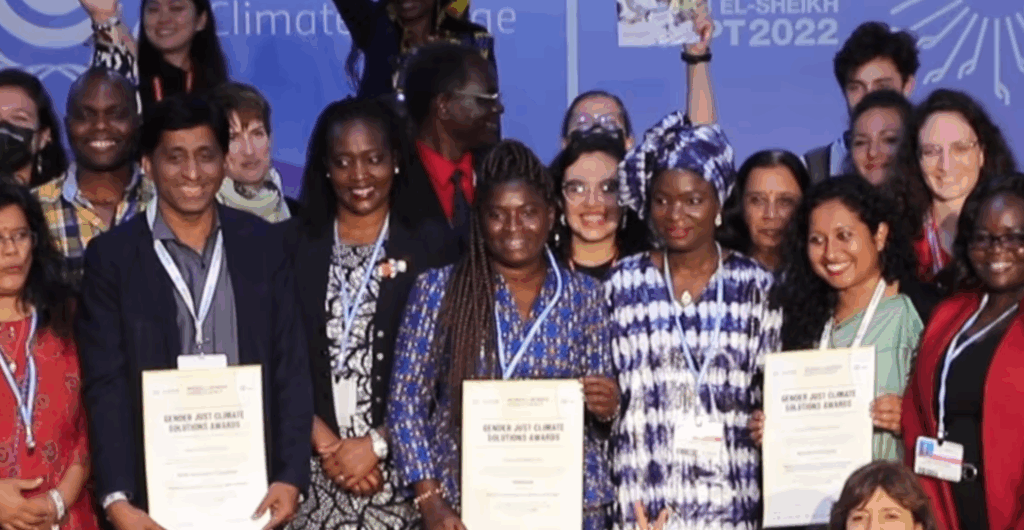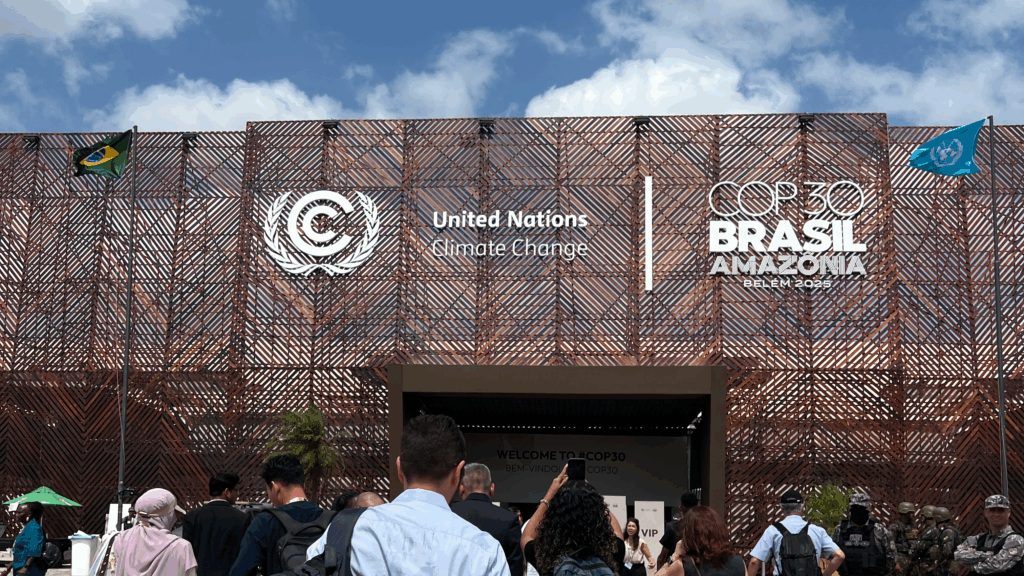Peoples Declaration
In the final days of COP27, the Women and Gender Constituency together with different civil society movements across the world endorsed a joint COP27 Peoples’ Declaration for Climate Justice. In the declaration we call for: (1) The decolonisation of the economy and out societies; (2) The repaying of climate debt and delivery of climate finance; (3) The defense of 1.5c with real zero goals by 2030 and rejection of false solutions; (4) Global solidarity, peace and justice.
WGC Organizing
“Each day at COP27, feminists and women’s rights advocates strategized, strengthened movement building, exchanged transformative pathways to climate justice through context specific and community-led climate solutions and facilitated solidarity and joy in the face of injustice, indecisive leadership and failed hope.” – Zukiswa White, WGC Coordinator
Lack of Urgency
“Even though COP 27 was meant to be an implementation COP, what we saw were submissions that further widened the gap between lived realities of women and communities at the frontlines of the crisis and consultations that were taking place. As a result, we find ourselves having to wait until 2025 for a loss and damage finance facility as disasters mercilessly ravage the global south leading countries into greater debt, and women and children adversely impacted. We want our fair share of climate action for a crisis that we did not cause.” – Anne Songole, FEMNET Climate Justice Coordinator, Kenya
“COP27 gave us crumbs, with some concessions here and there. But these come at a very high cost of sacrificing the healing of the planet with no real carbon emissions reduction from historical and current emitters. This is unacceptable!” – Tetet Lauron, Rosa Luxemburg Stiftung, Philippines
Unjust Process
“The fact that COP27 was happening on African soil, a continent that continues to bare the brunt of climate change was sufficient enough to have a critical and diverse representation of the marginalized constituencies especially women & adolescent girls from remote and conflict climate affected areas attend and meaningfully participate at this year’s COP” – Zoneziwoh Mbondgulo-Wondieh, Women for A Change – Founder and Director, Cameroon
“We must ensure that pledges of developed countries to boost climate solutions and finance come hand in hand with the commitment to fulfill their human rights obligations. We can’t keep on negotiating peoples rights at global climate talks. The rich must stop commodifying our rights especially women’s human rights and start paying for their ecological debt” – Patricia Wattimena, Asia Pacific Forum on Women, Law and Development
“Deliver Process Justice. Observers were consistently locked out of the negotiations rooms for a repeated ‘lack of sitting space’ excuse, as if they did not know how many people they have accredited. We have also witnessed painful orchestration of last minute decisions with few parties and cooperations who could afford extra days. This needs to be called out and ended.” – Mwanahamisi Singano, WEDO Senior Policy Lead, Tanzania.
“I am getting completely disillusioned with the way the negotiations are progressing. Year after year Parties from the world over, creating a huge level of carbon footprints gather in COP to discuss how each country should reduce their carbon emission and carbon footprint. And then there is prolonged debate on the ‘politics of words’ without actually discussing concrete action plans. Is the next COP going to be the same? But I am a woman from the south and I don’t give up. I hope that keeping in view the increasing climate crisis, I look forward to the Parties coming to Dubai with only delivery of pledged commitments, implementations and actions which are centered around cross-cutting issues of gender, human rights, life and planet.” – Kalyani Raj, All Indian Women’s Conference (AIWC)
Gender action plan
“I feel terrible that when it comes to gender issues, it becomes difficult to get commitments and yet we keep stating that it is important. How important gender issues cannot be qualified as we continue to fight for everything. We fought to get a GAP and now we are still fighting for the resources for the same implementation of the gap and the LWPG, so how truthful are we about gender? As African women and Girls, we are deeply concerned about the lack of commitment by parties as climate change continues to impact negatively on the continent thus impacting more on the women and girls” – Priscilla Achakpa, Women Environmental Programme Executive Director, Nigeria
“As a young African climate justice feminist, I came to COP27 excited to see concrete decisions to follow the intermediate review of the Gender Action Plan (GAP). I was keen to see ambitious vital texts that would draw on the recommendations of the Women & Gender Constituency. I longed for an outcome that would mandate equal and meaningful representation, leadership, and participation of women in UNFCCC’s decision-making and clear progress indicators in the next three years of the GAP implementation. A review that would strategize tangible resources and resourcing, including technical and financial, for National Gender Focal Points in a manner that legitimizes their role both at national and international climate policy decision-making levels. Rather, I witnessed restrictive negotiation processes that undermined my contributions. I observed the cunning political power play of ‘who pays for what’, at the expense of the sufferings of women and girls of intersecting diversities. I saw a weak, intangible, eleventh-hour GAP decision that merely sought to tick the box of arriving at an outcome. COP27 side-lined the gender agenda in climate action. It failed women human rights defenders, indigenous women, young women, National Gender Climate Change Focal Points and gender climate justice advocates clamoring for gender equality in climate action. – Zainab Yunusa, Climate Change and Development Activist, Nigeria
“Remarks about women and youth engagement have been regurgitated in well crafted speeches. Promises have been made year in year out but the reality check keeps us guessing whether the implementation of the GAP is a promise that may never be achieved. A gender responsive climate change negotiation is what we need. The time for action is yesterday” – Imali Ngusale, FEMNET – Communication Officer, Kenya
‘We are celebrating the historic establishment of the Loss and Damage Fund. Yes! It is a landmark. However, we are saddened by the outcomes of the implementation for the GAP. The GAP remains the beacon of hope for women and girls who are at the frontline of the climate crises. A gender-responsive solution equals a true climate justice” Queen Nwanyinnaya Chikwendu, Climate Change and SRHR Activist, Nigeria
Other Outcomes
Action for Climate Empowerment → “The approval of the Action for Climate Empowerment-ACE-Action Plan has provided a glimpse of hope that Parties understand there won’t be climate justice without Human Rights. The Action Plan will help to develop capabilities to protect and enhance the rights of access to information, to public participation, and for education. The plan is coming close to an intersectional analysis focusing on the needs of children and youth, women and girls, indigenous Peoples and people with disabilities. We regret that the collaborative ACE consultations including observers’ expertise was an exception during this COP27. We demand the same standard for all themes from L&D, adaptation, mitigation and article 6 to Gender.” – WGC ACE team (Babitha PS, Floridea Di Ciommo, Pat Bohland)
Agriculture → “The recognition of the fundamental priority of safeguarding food security and ending hunger and the particular vulnerability of food production systems to the adverse impacts of climate change are important steps at this COP. However, we are concerned with the enhancement of carbon sinks for issues of soil carbon, soil health and soil fertility instead of considering agroecology as a natural, ecosystem based approach. While small-scale farmers and women are recognized as key-role players, it has been missed to apply a gender responsive approach.” – Ndivile Mokoena, GenderCC, South Africa
Markets →“While running out of time to keep the 1.5°C temperature goal in reach, this COP has shown once again that off-setting, the creation of loopholes, and paving the way for risky technologies through market mechanisms are more agreeable than ensuring the establishment of social and environmental safeguards, and gender-responsive solutions and action to phase-out fossil fuels.” – Hwei Mian Lim, Independent Advisor
Contacts:
Zukiswa White, zukiswa@womengenderclimate.org
Lindsay Bigda, lindsay@wedo.org



